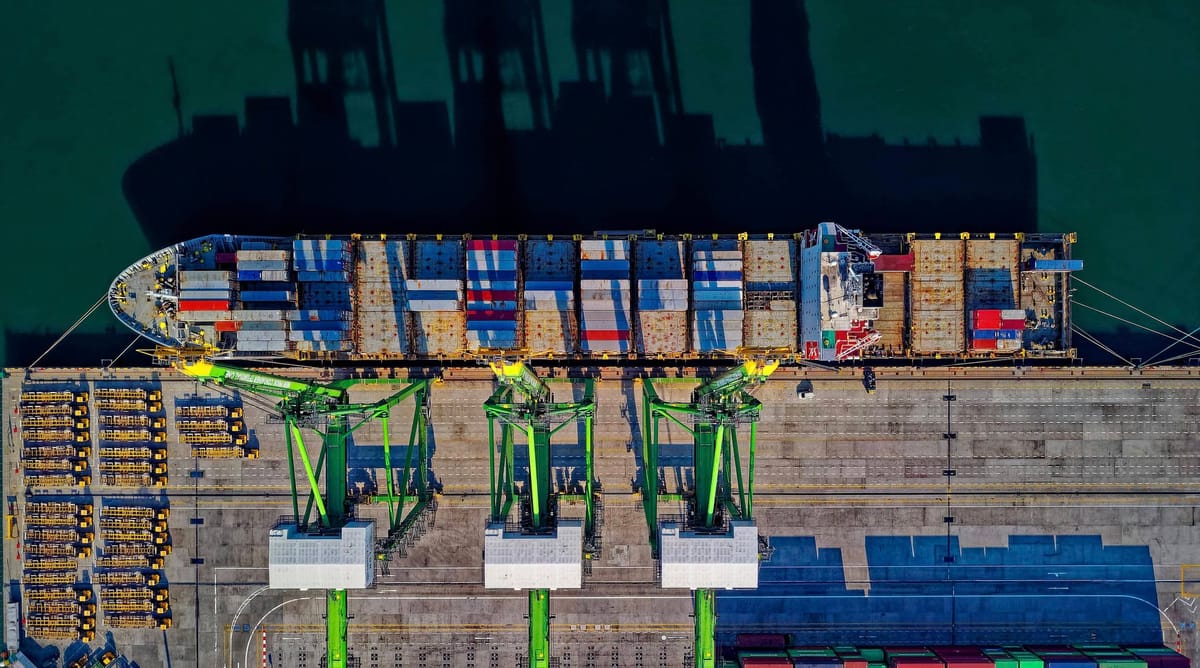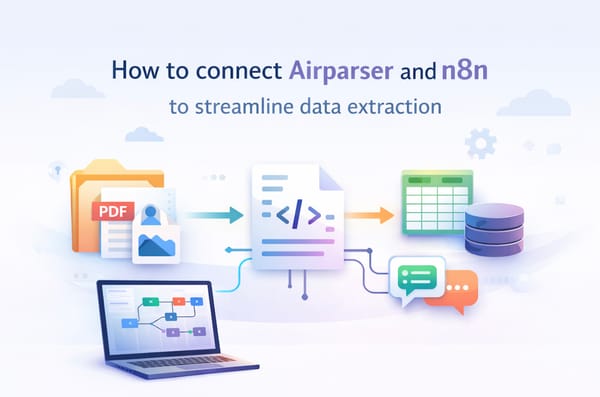Common Challenges in Logistics Document Parsing
Overcome logistics document parsing challenges with Airparser. Learn how to handle multiple document types, ensure accuracy, and scale your operations

Logistics companies handle a vast amount of paperwork daily. From invoices to shipment notices, customs forms, and more, managing these documents efficiently is crucial for smooth operations. However, document parsing in logistics comes with its challenges. These challenges can slow down processes and lead to errors that affect the entire supply chain. In this article, we'll explore the common challenges logistics companies face with document parsing and how Airparser can help overcome them.
Common Challenges in Logistics Document Parsing

Challenge 1: Handling Multiple Document Types
Explanation
Logistics companies deal with a variety of documents, each with its own format and layout. These include invoices, packing lists, shipment notices, customs forms, and more. The challenge arises when trying to extract data from these different document types. Traditional systems often struggle with this because they rely on fixed templates, which don’t work well with documents that vary in format.
Issue
When you have multiple document types from different vendors, the formats can vary greatly. This makes it difficult to create a one-size-fits-all solution for data extraction. As a result, companies may need to manually sort and process documents, which is time-consuming and prone to errors.

Challenge 2: Ensuring Accurate Data Extraction
Explanation
Accuracy in data extraction is vital in logistics. A single error in extracting data from documents can lead to serious issues, such as incorrect shipments, delays, or financial discrepancies. Accurate data extraction ensures that all logistics operations run smoothly, but achieving this accuracy is challenging, especially with unstructured documents or handwritten notes.
Issue
Manual data entry and even some automated systems can make mistakes, especially when dealing with complex or poorly formatted documents. These errors can accumulate over time, leading to significant problems in inventory management, order processing, and shipment tracking.
Challenge 3: Dealing with Unstructured Documents
Explanation
Unstructured documents, such as emails or reports, do not follow a standard format. They often contain important information scattered throughout the text, making it difficult to extract the necessary data efficiently.
Issue
Traditional document parsing tools often fail to handle unstructured documents effectively. This means that critical information might be missed, or manual intervention might be required to process these documents, which again slows down the workflow.
Challenge 4: Scalability and Volume Management
Explanation
As logistics companies grow, the volume of documents they need to process increases significantly. This puts a strain on existing document parsing systems, which may not be able to handle the increased load effectively.
Issue
Without scalable solutions, companies may find themselves overwhelmed by the sheer volume of documents, leading to delays and reduced efficiency. Ensuring that document parsing systems can scale with business growth is essential for maintaining smooth operations.
Challenge 5: Integration with Existing Systems
Explanation
Logistics companies often use various software systems to manage different aspects of their operations. Integrating a document parsing tool with these systems is essential for seamless data flow and efficient processing.
Issue
Integration can be challenging, especially if the document parsing tool is not compatible with the existing systems. This can lead to data silos, where information is not shared effectively between systems, resulting in inefficiencies and errors.
How Airparser Helps Overcome These Challenges

Airparser’s Solution for Handling Multiple Document Types
Airparser is designed to handle a wide range of document types and layouts. Whether you’re dealing with structured invoices or unstructured handwritten notes, Airparser’s advanced GPT-powered parsing can adapt to any format. This flexibility eliminates the need for multiple systems or manual sorting, allowing you to process all your documents efficiently.
For more information on handling different document types, you can read our article on Zonal OCR vs GPT-Powered Data Extraction.
Airparser’s Solution for Ensuring Accurate Data Extraction
Airparser excels in accurate data extraction thanks to its custom schema creation and AI-driven parsing. You can create an "inbox" in Airparser where you forward your documents and define the fields (data points) you need to extract. Airparser then does the rest, ensuring that the extracted data is reliable and accurate. This reduces the risk of errors and ensures that your logistics operations remain efficient.
Airparser’s Solution for Dealing with Unstructured Documents
Airparser’s AI and machine learning capabilities make it highly effective at parsing unstructured documents. It can read through the text, understand the context, and extract the relevant data without missing any critical information. This capability is particularly useful for processing emails, reports, and other unstructured documents that are common in logistics.
For more insights on dealing with unstructured documents, check out our article on The Role of AI in Document Parsing for Logistics Companies.
Airparser’s Scalability for High Volume Document Parsing
As your business grows, Airparser grows with you. Its scalable architecture allows it to handle large volumes of documents without compromising on speed or accuracy. Whether you’re processing a few dozen documents or thousands, Airparser ensures that your operations continue to run smoothly.
Airparser’s Easy Integration with Existing Systems
Airparser is built for easy integration with existing logistics management systems (LMS). It offers multiple integration options, including API, webhooks, and connections through platforms like Zapier and Make. This ensures that data flows seamlessly between systems, improving overall efficiency and reducing the risk of data silos.
For a deeper dive into integrating document parsing with your LMS, you might want to read our article on Integrating Document Parsing into Your Logistics Management System.
Real-World Examples and Success Stories
Case Study 1: Handling Diverse Document Types
A logistics company dealing with multiple vendors used Airparser to handle a variety of document types. The company was able to streamline its document processing, reducing the time spent on manual sorting by 50%. This led to faster operations and improved accuracy.
Case Study 2: Achieving High Accuracy in Data Extraction
Another company used Airparser to ensure accurate data extraction from invoices, even when dealing with handwritten notes. The result was a significant reduction in errors, leading to more reliable financial records and smoother operations.
Case Study 3: Scaling Document Parsing Effortlessly
A third company faced challenges as their business grew and the volume of documents increased. By integrating Airparser, they were able to scale their document parsing effortlessly, handling thousands of documents daily without any slowdown.
Conclusion
Document parsing is a critical component of logistics operations, but it comes with its challenges. From handling multiple document types to ensuring accurate data extraction and scalability, these challenges can impact your efficiency and accuracy. However, with Airparser, these challenges become manageable. Airparser offers flexible, accurate, and scalable solutions that integrate seamlessly with your existing systems, making it an ideal choice for logistics companies.
If you’re ready to overcome your document parsing challenges, consider trying Airparser. With its advanced features and user-friendly design, Airparser can help you streamline your logistics operations and improve overall efficiency.
For more information on how Airparser can benefit your logistics operations, visit our blog or contact us directly.




